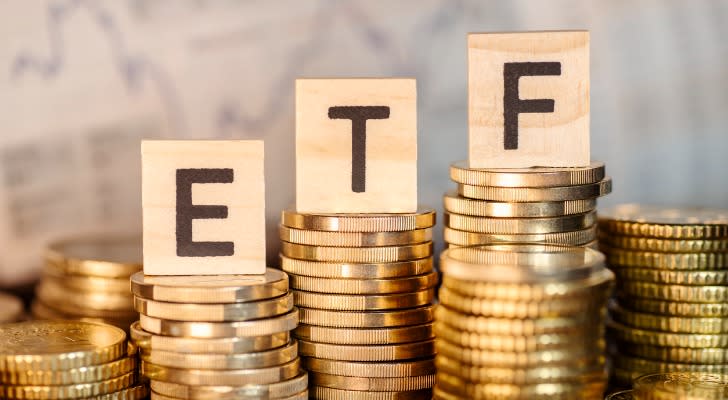The tax efficiency of exchange-traded funds (ETF) derives from their unique structure and trading mechanisms. Unlike mutual funds, the trading of ETFs does not trigger capital gains taxes until the investment is sold. This factor can prove advantageous for investors wanting to minimize the impact of taxes on their investment returns. Imagine an investor who has held their ETFs for an extended period. They would avoid capital gains tax until they decide to sell, potentially yielding higher returns. A financial advisor can help you evaluate ETFs and pick other investments for your portfolio.
How Exchange-Traded Funds Work
At their core, ETFs are baskets of securities that track an underlying index, sector, commodity or asset. They mirror the diversification benefits of mutual funds slimmed down into a single, fluidly traded asset. This diversification helps reduce individual stock risk.
Moreover, ETFs tend to have lower expense ratios when compared with mutual funds because they are passively managed. This means lower costs for investors over the long term.
ETFs also offer enhanced liquidity to investors. They can be bought or sold throughout the trading day at market prices, just like stocks. This liquidity is a stark contrast to traditional mutual funds, which are typically priced at the end of the trading day. Investors can use limit orders, stop orders, and other advanced trading techniques to control the price at which they buy or sell ETF shares.
Why ETFs Are Tax Efficient
Compared with actively managed mutual funds, ETFs tend to have lower portfolio turnover since they often track broad market indices passively. This means they buy and sell securities less frequently than their more active counterparts. Lower turnover results in fewer capital gains realizations, which in turn reduces the tax liabilities for investors.
Another reason that ETFs are tax-efficient lies in their unique structure. ETFs allow for in-kind creation and redemption of shares. When an investor wants to buy or sell shares of an ETF, this often happens through the exchange of a portfolio of securities rather than cash. This mechanism minimizes capital gains events within the ETF, reducing taxable distributions.
Additionally, lower expense ratios mean less drag on returns, leaving more of the investment’s growth intact. This can result in greater tax efficiency over the long term when compared with mutual funds.
Tax Treatment of ETFs
Understanding the tax implications for different types of ETFs can provide valuable insights for investors. Let’s delve into the unique tax considerations for a variety of ETFs.
Equity ETFs
Equity ETFs, which track stock indices, offer investors a way to invest in a broad range of companies with a single purchase. The investment gains of equity ETFs are typically subject to capital gains tax rates. Additionally, dividends received from these ETFs also trigger taxes.
If you hold an equity ETF for less than one year and then sell it for a profit, the gains are considered short-term capital gains, which are usually taxed at your ordinary income tax rate. Holding an equity ETF for more than one year before selling typically qualifies your gains as long-term capital gains. Long-term gains are taxed at either 0%, 15% or 20% depending on the investor’s income.
Equity ETFs often pay dividends from the income generated by the underlying stocks. These dividends can be subject to different tax rates, depending on the type of dividend and your income level. If the ETF’s dividends are classified as qualified, they can benefit from lower tax rates, similar to long-term capital gains rates. If the dividends don’t meet the criteria for qualified dividends, they are taxed at your ordinary income tax rate.
Bond ETFs
Bond ETFs track the bond market indices, serving investors with a diversified bond portfolio in a single purchase.
Interest income generated by the underlying bonds is one of the primary sources of returns from bond ETFs. This interest income is generally taxable at the federal level and may also be subject to state and local taxes. The tax rate you’ll pay on this income depends on your overall taxable income and your tax bracket. Bond ETFs can also generate capital gains or losses when their underlying bonds are bought or sold within the fund.
Commodity ETFs
A commodity ETF is a type of exchange-traded fund that tracks the performance of a specific commodity or a basket of commodities. Commodities encompass a wide range of raw materials, including precious metals like gold and silver, energy resources like oil and natural gas, agricultural products like corn and soybeans, and even exotic items like coffee or cocoa.
However, these ETFs are often structured as “limited partnerships” – a business structure that combines elements of partnerships and corporations. As a result, their tax treatment is different. In layman’s terms, gains from commodity ETFs can be taxed even if the ETF is not sold. Furthermore, some metal ETFs could be subject to something called the “collectibles tax,” which is generally steeper than the long-term capital gains tax rate, reaching up to 28%.
Currency ETFs
Currency ETFs give investors a foot in the door of the foreign exchange markets. But keep in mind that these types of ETFs usually incur the ordinary income tax, irrelevant of the holding period. So, unlike equity and bond ETFs, currency ETFs don’t benefit from reduced tax rates on long-term capital gains and qualified dividends.
Exchange-Traded Notes (ETNs)
While exchange-traded notes (ETNs) are traded on stock exchanges like ETFs, the former is a type of unsecured debt security tracking an underlying index. In simple words, you’re lending your money to an institution, betting it will pay off.
One defining characteristic of ETNs that makes them a tax-efficient choice is their exemption from dividends and capital gains until they’re sold. This means they are only subject to capital gains tax when sold, thus advantageous for investors planning to hold onto their investments for extended periods.
Bottom Line
Through their structure and trading mechanism, ETFs offer unique tax advantages, potentially reducing investors’ tax liabilities and maximizing net returns. However, remember that different types of ETFs have different tax implications, thus making it crucial to understand these before investing.
Portfolio Management Tips
Asset allocation is a portfolio’s strategic mix of different assets. Spreading your money across various asset classes, and even different sectors, can help balance risk. SmartAsset’s asset allocation calculator can recommend a mix of stocks, bonds and cash that’s appropriate for your risk tolerance.
A financial advisor can help you select investments for your portfolio and manage them holistically. Finding a financial advisor doesn’t have to be hard. SmartAsset’s free tool matches you with up to three vetted financial advisors who serve your area, and you canhave a free introductory call with your advisor matches to decide which one you feel is right for you. If you’re ready to find an advisor who can help you achieve your financial goals, get started now.
Photo credit: ©iStock.com/gopixa, ©iStock.com/Mindful Media, ©iStock.com/ArtistGNDphotography
The post Tax Efficiency of ETFs: What Benefits Do They Offer? appeared first on SmartReads by SmartAsset.


